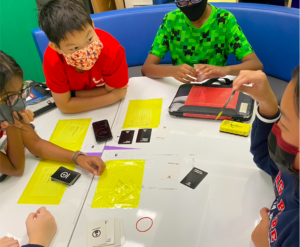Fun Ways for Students to Learn Through Argument
A MiddleWeb Blog
 Reading Mary Ehrenworth, Pablo Wolfe and Marc Todd’s professional development book, The Civically Engaged Classroom, gave me a new mindset on teaching argument writing to students, based on the idea of arguing to learn.
Reading Mary Ehrenworth, Pablo Wolfe and Marc Todd’s professional development book, The Civically Engaged Classroom, gave me a new mindset on teaching argument writing to students, based on the idea of arguing to learn.
The authors write: “If you and your class enter into argumentation with the idea that everyone will learn from those whose positions differ, then your students will be willing to accept different points of view more gracefully – and perhaps even change their own” (129).
In our school, we do so much work in many subject areas to ensure that our students understand audience and perspective. I love that idea of shifting our goals of argumentation to include widening students’ perspectives, with the bonus of making them more open-minded people.
Arguing energetically
One of my favorite ways to build argumentation, research, and collaboration skills while increasing student comfort with public speaking is the Argument Protocol, which I learned almost a decade ago at the Columbia Teachers College Reading Institute. This activity produces frenetic, enthusiastic research and sharing of information. When it is time for students to line up and debate their partner, it is a high volume and high energy affair.
Because of this, students who are hesitant to speak up are more comfortable because it is clear that nobody but their partner can hear them! Even better, this activity can be repeated many times with different topics – and students do better with every iteration.
A winning argument

Superfight in action
I’m a huge proponent of using games in class, so I was excited to discover the board game, Superfight. (Note: As of January 2025, the Superfight core deck of 500 cards – black box – was still available from businesses specializing in games. Try a Google search.)
In this game, two players flip over two different decks of cards: the first deck offers characters (ex. Abraham Lincoln, a sumo wrestler) and the other deck has ability/attribute cards like “10 stories tall” or “throws bears.” After the giggles over who the fighters are, students need to persuade the judge(s) that they would win in a competition.
In the original rules for the game, it is a physical fight, but I modified the game for situations more suitable for the classroom. We reviewed argument techniques in advance, and after the game students discussed which argument strategies were most convincing.
The next step is to transfer these skills to their writing.
When the audience counts
Another board game that we played to grow their argument skills was Snake Oil, which has the premise of combining two words to create a product to pitch to a specific client. The company has generously posted an online version of the game for teachers, as well as suggestions for how to use it in class. We used the physical version of the game, and I made extra “client” cards with names of people in our community.
This is the perfect game to start a class that focuses on teaching students to pay attention to their audiences in their writing. Once students have developed the knack of pitching verbally to a specific audience, they should continue that practice with their writing topic. Verbally rehearsing their arguments with a partner is key to deepening their reasoning.
Beyond what Socrates could have imagined
If you’re looking for an assessment that ensures that all students are participating in the argument experience, I haven’t seen anything better than the Socratic Smackdown. I’ve used this free game as an assessment in multiple content areas and grade levels, and it is a fair and organized way for students to demonstrate their knowledge and skills. (The link above leads to a PDF with everything you need.)
I often have students do a practice Smackdown about an alternate topic before they begin their research; they learn the rules of the game and how best to optimize their argument and get the most points.
Yes, there are points! Students who are not actively debating in the Socratic ‘fishbowl’ are either reflecting on their own debate or scoring the students currently debating. All students are engaged in a task that will improve their performance the next time they debate.
Arguing with a purpose
When the goal is for students to argue to learn, the task becomes less competitive and more enriching. As Joseph Joubert wrote, “The aim of argument, or of discussion, should not be victory, but progress.” Imagine the progress we will make with a class of students who consider perspectives, acknowledge their audience, and argue knowledgeably.





























Thanks for this and for all the resources and links. It’s very helpful and the game activities seem engaging. I hope to try a few out this year.
Kevin
Hi Kevin,
Thanks for the comment! Enjoy the end of the year.
These are great resources! I especially like the modifications to Superfight. I can see some great conversations stemming from that.
I am a little concerned about the Socratic Smackdown, though. The directions say that students lose points for “disrespectful behavior, like interrupting.” One of the symptoms or results of neurodivergence like ADHD is interrupting. I don’t like the idea of making a kid lose points due to actions that stem directly from them being neurodivergent…and then labeling that behavior as “disrespectful” on top of that? Something to consider for sure.